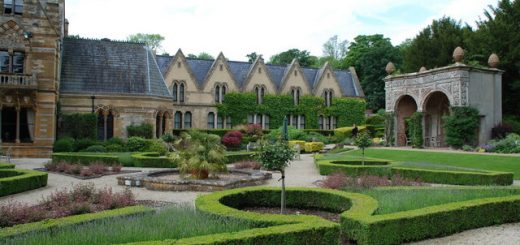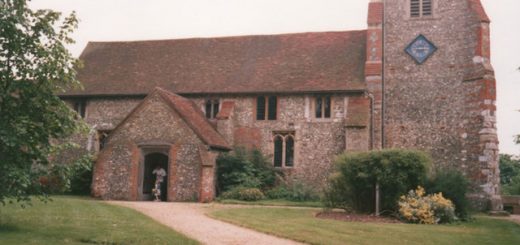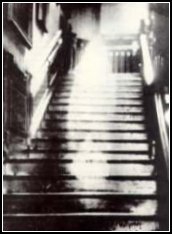Volantine Austin’s House, Cambridge (1694)
A strange experience concerning a potential haunting was recounted in the The Diary of Abraham de la Pryme, the Yorkshire Antiquary, published 1870. This haunting seemed to have made an impression on 17th century Cambridge though given the way in which the activity ceased it is very possible that the events were hoaxed.
Abraham de la Pryme (born 15 January 1671 – died 12 June 1704) attended St John’s College at Cambridge as a pensioner (a student who is not a scholar and pays for their own tuition) graduating in 1694. According to ‘A Genealogical and Heraldic History of the Commoners of Great Britain and Ireland’ by John Burke (1838), whilst at Cambridge, “In addition to the usual classical and philosophical studies, (Abraham) applied himself to natural history, chemistry, and magic!” Burke goes on to say that during his time at college he made several unsuccessful attempts with his friends to “hold intercourse with the world unknown” after which he later expressed his mortification that nothing appeared. On his later opinions of the supernatural Burke states “His mind, however, soon became emancipated from every species of superstition; and on a future occasion, he took considerable pains to expose the improbability of preternatural appearances.”
According to The Diary of Abraham de la Pryme for the year 1694:
May 19. Yesterday I received two letters from Cambridge, giving an account of all the newse, and whatever was most memorable. In one of them I received a long account of a house that was pretended to be hanted, to this effect: —
About a month ago it began to be rumor’d abroad that Volantine Austin’s house over against our college began to be haunted, and strange noises were as it were heard up and down about the house, and thus it stood for the most part of the week, but were more and more buz’d up and down the town. The second week the noises began to be greater, and pebbles and little stones began to be thrown here and there through a hole under the door. Thus the sport continued most of that week The room, which was haunted, was a low ceeled room with a celler under it, having a bed in the room in which the Mr. and Mrs. lay every night. They pretended to be mighty fearfull, and gave any one liberty to go where he would and search about the house. But the third week now coming on, on Monday night, about 2 a clock at night it made a great hollow noise and gingl’d money, and broke the windows by flinging little stones at them, and raised a stink of brimstone, and frighted several old poor women that watched, so that they run away into the street, and came there no more. But next morning all the town almost believed it, and at night there was above three score people flocking about the door to hear this spirit, among whom there was Clifford Hall, Obadiah Harrop, John Millard, and several other scholars of our college of my accquaintance. “Come, sais one of them, “fetch us a good pitcher of ale, and tobacco and pipes, and wee’l sit up and see this spirit.” “With all our hearts,” say’d three or four more; so they sent for the ale, and, as they went in, the people exclaimed against them sadly, crying “Oh, you wicked wretches, will you have the divel to fetch you?” etc. Then, as soon as they got in, the man and woman being in bed ith’ room, they exclaimed against them again, but they cared not, but sat singing and drinking there till morning, but neither heard nor saw anything. But the night after, which was Wednesday night, Mr. Walker, minister of the Round Church, and some more with him, hearing of all that had pass’d, went to pray in the house, and, as they were praying, they heard a great bellowing voice, and in at the window out of the fold was flung a great pot of paint with such force that it broke all the glass window in pieces, and had like to have bitten Mr. Walker on the head. All which time there was at least a hundred people before the dore, but when they heard such a noise, away they all ran as if the divel was in them, and as soon as they had ended their prayers away went they, also sadly frighted, and fully satisfy’d that it was the divel! Now the whole town was in an uproar, and nothing but the divel was in every one’s mouth. Nay, Mr. Walker had no more witt but to make a long sermon the next Sunday to his people in the Round Church about it, and to tell them the whole story of the same.
Thursday night, Friday night, and Saturday night nothing was heard, tho’ there was a great many earnestly expecting the same But, Sunday night there being but few watchers, viz., four old women, it made a great noise and gingled money, and flung 6s. into the room, which lay there all the following day, and nobody durst take or meddle, with it.
It being nois’d about that the disturber was come again Mr EdwardKenyon, fellow of our college and Mr John Hope, and Mr Richard Headlam, two of our fellows more, with young Sir Francis Leicester, made an agreement amongst themselves to go thither exactly when the disturber was playing his pranks, and to shoot off their pistols towards any place where the noise was heard. So having on Monday night by one of their spys had information that the disturber was heard, they all went, and rushing together into the room talked high and charged their pistols before the people’s faces that were there, and protested they would discharge them towards the place where any noise was heard, saying that it was a shame that a rogue and a villane should make such a noise in a town and disturb the whole neighbourhood with his knavish tricks etc.
But the divelish disturber having att this thought it best to be packing, and never to come there more, so accordingly they frighted him so that never any more disturbance was heard there, and so ended the whole scene of imposture, for every one but old wives and other such like half-witted people never reckoned it to be anything else.
On Monday night likewise there being a great number of people at the door, there chanced to come by Mr. Newton (Sir Isaac Newton), fellow of Trinity College: a very learned man, and perceiving our fellows to have gone in, and seeing several scholars about the door, “Oh! yee fools,” says he, “will you never have any witt, know yee not that all such things are meer cheats and impostures? Fy, fy! go home, for shame,” and so he left them, scorning to go in.
I am unsure of the exact location of Volantine Austin’s House circa 1694, so the map shows the location of St John’s College that the building was said to be near.




Re: Volantine Austin’s House, Cambridge (1694)
So threatening to shoot the source of the ghostly noises solved the case. Is the answer to scrap the EMF’s get yourself a shotgun?